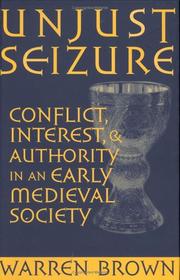| Listing 1 - 4 of 4 |
Sort by
|
Book
ISBN: 0719055652 0719055644 9780719055645 9780719055652 Year: 1999 Publisher: Manchester: Manchester University press,
Abstract | Keywords | Export | Availability | Bookmark
 Loading...
Loading...Choose an application
- Reference Manager
- EndNote
- RefWorks (Direct export to RefWorks)
Immuniteit (Feodaliteit) --- Immunity (Feudalism) --- Immunité (Féodalité) --- Power (Social sciences) --- Middle Ages --- Privileges and immunities --- History --- Europe --- Politics and government --- 476-1492 --- Power (Social sciences) - Europe - History --- Privileges and immunities - Europe - History

ISBN: 3465027728 3465028996 9783465028994 9783465027720 Year: 1999 Volume: 125 Publisher: Frankfurt am Main: Klostermann,
Abstract | Keywords | Export | Availability | Bookmark
 Loading...
Loading...Choose an application
- Reference Manager
- EndNote
- RefWorks (Direct export to RefWorks)
Privileges and immunities --- History. --- History of the law --- -Immunities and privileges --- Immunity (Exemption) --- Jurisdiction --- State's evidence --- Constitutional law --- Criminal procedure --- History --- Law and legislation --- anno 1500-1799 --- -History --- Privileges and immunities - Europe - History.
Book
ISBN: 0841908737 9780841908734 Year: 1983 Volume: 1 Publisher: New York (N.Y.): Holmes and Meier,
Abstract | Keywords | Export | Availability | Bookmark
 Loading...
Loading...Choose an application
- Reference Manager
- EndNote
- RefWorks (Direct export to RefWorks)
Privileges and immunities --- Nobility --- History --- -Privileges and immunities --- -Immunities and privileges --- Immunity (Exemption) --- Constitutional law --- Criminal procedure --- Jurisdiction --- State's evidence --- Noble class --- Noble families --- Nobles (Social class) --- Peerage --- Upper class --- Aristocracy (Social class) --- Titles of honor and nobility --- Law and legislation --- #A9205H --- History. --- -History --- Privileges and immunities - Europe - History --- Nobility - Europe - History

ISBN: 0801437903 9780801437908 0801474698 9780801474699 Year: 2001 Publisher: Ithaca (N. Y.): Cornell university press,
Abstract | Keywords | Export | Availability | Bookmark
 Loading...
Loading...Choose an application
- Reference Manager
- EndNote
- RefWorks (Direct export to RefWorks)
Most scholarship in English on the political and social order of early medieval Europe concentrates on the Western Frankish regions. Warren Brown shifts the focus to the East, concentrating on conflicts and their resolutions to learn how a central authority could affect local societies in the Middle Ages. Brown delves into the rich archival materials of eighth- and ninth-century Bavaria, exploring how Bavarians handled conflicts both before and after the absorption of their duchy into the empire of Charlemagne. The ability to follow specific cases in remarkable detail allows Brown to depict the ways the conquered population reacted to the imposition of a new central authority; how that authority and its institutions were able to function in this far-flung outpost of Charlemagne's realm; and how the relationship between royal authority and local processes developed as the Frankish empire unraveled under Charlemagne's heirs. By drawing on the recent work of anthropologists and political scientists on topics such as dispute resolution and the dynamics of conquest and colonization, Brown considers issues larger than the procedures for handling conflict in the early Middle Ages: How could a ruler exercise power without the coercive resources available to the modern state? In what ways can a people respond to military conquest?
Carolingians. --- Property --- Power (Social sciences) --- Carolingiens --- Propriété --- Pouvoir (Sciences sociales) --- History. --- Histoire --- Bavaria (Germany) --- Europe --- Germany --- Bavière (Allemagne) --- Allemagne --- History --- Social conditions --- Religious life and customs --- Conditions sociales --- Vie religieuse --- Privileges and immunities --- Civilization, Medieval. --- Propriété --- Bavière (Allemagne) --- Carolingians --- Civilization, Medieval --- Economics --- Possession (Law) --- Things (Law) --- Wealth --- Immunities and privileges --- Immunity (Exemption) --- Constitutional law --- Criminal procedure --- Jurisdiction --- State's evidence --- Empowerment (Social sciences) --- Political power --- Exchange theory (Sociology) --- Political science --- Social sciences --- Sociology --- Consensus (Social sciences) --- Medieval civilization --- Middle Ages --- Civilization --- Chivalry --- Renaissance --- Carlovingians --- Carolinians --- Law and legislation --- Holy Roman Empire --- Primitive property --- Property - Europe - History. --- Power (Social sciences) - Europe - History. --- Privileges and immunities - Europe - History.
| Listing 1 - 4 of 4 |
Sort by
|

 Search
Search Feedback
Feedback About UniCat
About UniCat  Help
Help News
News